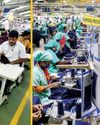Modi’s inclusive growth agenda needs more reforms to succeed

As if the slogan ‘Sabka saath; sabka vikas’ (Along with all, development for all)” was not fully expressing his concern for the country’s poor, Prime Minister Narendra Modi has come out with another charming phrase “ease of living”. This one is exclusive; the earlier slogan has travelled Indian political agenda, although in different words, for years and evoked mixed reactions from cynicism to optimism. These are beautiful phrases and Modi’s dramatic orating prowess spreads an illusory web. An average Indian likes to believe in him
Optimism apart, what has been done to achieve an inclusive growth, nay, development for all? India seems to have depended largely on the trickle-down effect of growth so far to benefit the poor who were not direct participants of economic growth. But despite this, high growth has helped to reduce the percentage of people living below the prescribed poverty line. The proportion of people living below the poverty line came down from 37.2% in 2004-05 to 21.9% in 2011-12.
Good progress by any standard, but India still has the largest number of poor people. According to a 2015 World Bank report, ‘Taking on Inequality’, India has the most number of people, some 224 million, living below the international poverty line of $1.90 a day
How to bring this figure further down? Modi’s ‘ease of living’ slogan probably has the answer. Ease of living, in a way refers to inclusive growth that does not stop at raising income of the poor or by proving with time-bound employment opportunities.
According to the World Bank, “rapid and sustained poverty reduction requires inclusive growth that allows people to contribute to and benefit from economic growth. Inclusive growth refers both to the pace and pattern of growth, which is considered, interlinked, and therefore in need to be addressed together”.
This story is from the February, 1-15, 2018 edition of BUSINESS ECONOMICS.
Start your 7-day Magzter GOLD free trial to access thousands of curated premium stories, and 9,000+ magazines and newspapers.
Already a subscriber ? Sign In
This story is from the February, 1-15, 2018 edition of BUSINESS ECONOMICS.
Start your 7-day Magzter GOLD free trial to access thousands of curated premium stories, and 9,000+ magazines and newspapers.
Already a subscriber? Sign In

Bank of Baroda, Kolkata Zone organised Mega Kisan Melas in West Bengal
Bank of Baroda (BOB) organised Mega Kisan Mela at Konkalitala in Birbhum District of West Bengal on November 18, 2024 as a part of the 7th Edition of the Baroda Kisan Pakhwada (BKP).

Time-Bound Disposal of Cases to Expedite the Delivery of Justice and affordabe by all in India
The delay in the disposal of cases in Indian courts remains a significant hurdle to the nation's progress.

Dev Deepawali: A grand celebration of light, spirituality, and culture in Varanasi
The holy city of Varanasi, often regarded as India's spiritual and cultural heart, came alive with the splendor of Dev Deepawali on the sacred day of Kartik Purnima.

The life of Job 'Ye judge not the judgment of God' - Jesus Christ
The Holy Bible reveals through the life of Job how the Lord tests the righteous and that faith helps one to overcome life's adversities.

India has the highest potential for the garment industry, only a conducive government policy is required.
India's textile industry is poised for remarkable growth, with expectations to double its contribution to the GDP within the next six to seven years.

Global Public Debt may be worse than it appears, warns IMF
Global Public Debt Set to Exceed $100 Trillion, Warns IMF

The economic consequences of Trump's Presidency: A global perspective
One of the key economic factors contributing to the Democrats' loss in the US elections was the significant rise in inflation, which was initially triggered by the COVID-19 pandemic and exacerbated by the Russia-Ukraine war.

Challenges and Successes in West Bengal's Education Sector: A Comprehensive Overview
The education system in West Bengal, particularly in districts, villages, slums, and government institutions, reflects a blend of progress and ongoing challenges.

What India can expect from Trump's return
I may be too early to predict how Donald Trump's second term as president will impact the global oil market.

Stocks Surge Following Donald Trump's Election as 47th President of the USA
Stocks soared following the election of Donald Trump as the 47th President of the United States. Investors anticipated that the Information Technology (IT) sector would benefit from lower corporate taxes under the Republican regime, with IT stocks leading the rally.